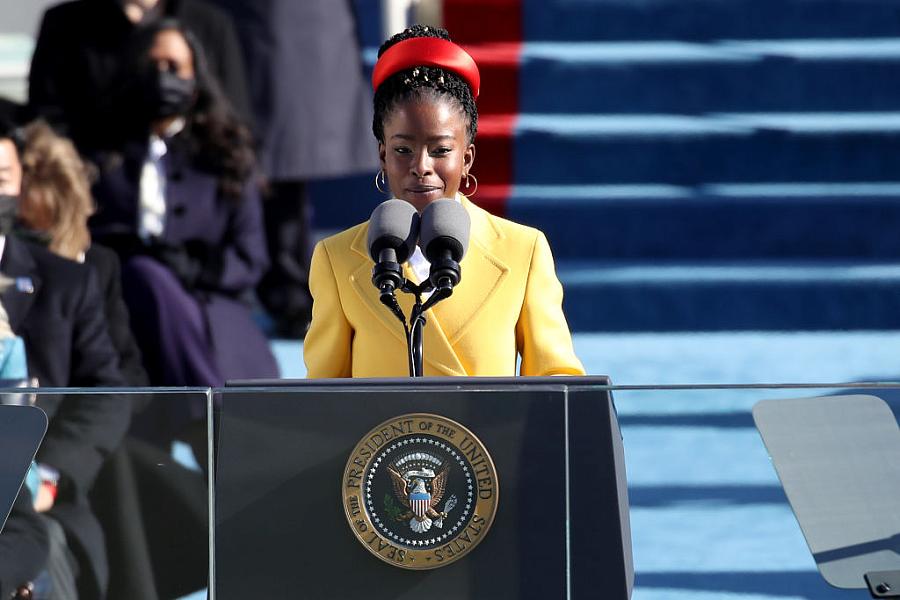The meaning of Amanda Gorman

(Photo by Rob Carr/Getty Images)
By Allissa V. Richardson
Amanda Gorman is having a banner year.
In January, the 23-year-old poet laureate dazzled the world with her six-minute Inauguration Day piece, “The Hill We Climb.” In February, she recited “Chorus of the Captains” at the Super Bowl, making her the first-ever laureate to grace the game.
Now Gorman is making headlines of a different kind. Early in March she opened up about the racial profiling she received just weeks after these milestones.
Gorman told her 3.6 million Instagram followers that a security guard followed her home on March 5 because she looked “suspicious.” She wrote: “He demanded if I live there ... I showed my keys and buzzed myself into the building. He left, no apology. This is the reality of black girls: One day you’re called an icon, the next day, a threat.”
Gorman continued: “In a sense, he was right. I AM A THREAT: a threat to injustice, to inequality, to ignorance. Anyone who speaks the truth and walks with hope is an obvious and fatal danger to the powers that be. A threat and proud.”
A sea of followers thanked Gorman for her bravery. As I read through the hundreds of comments on her page, it occurred to me that Gorman’s appearance on the world stage introduced us to a new kind of icon. While she reminds us of how far Black women have come, she is not letting us forget the perils that lurk for girls who look like her. And as she spent the rest of the weekend thanking the Black women in her life who supported her after the incident, I felt compelled to thank the “threatening” Black women who have inspired dynamic cultural conversations such as these.
When journalists regularly acknowledge Black women and their strides in every sector, the reporting helps to dismantle white supremacy and patriarchy in one fell swoop. America did not get a presidential inauguration dais full of joyful, trailblazing Black women without first benefitting from their often invisible labor, pain and love. So many of this century’s most potent social justice movements — Black Lives Matter, #MeToo, and #OscarsSoWhite most notably — were launched by Black women.
We can start by thanking the late Dr. Maya Angelou. She paved the way for Amanda Gorman, by serving as a poet laureate for President Bill Clinton’s inauguration in 1993. That is why Gorman wore a golden bird ring on her finger on Inauguration Day. It paid homage to Dr. Angelou’s definitive memoir, “I Know Why the Caged Bird Sings.” Oprah Winfrey gifted Gorman the jewelry, just as she gifted Dr. Angelou a Chanel coat for her oration nearly 30 years ago.
We should thank the late Charlotta Bass and Shirley Chisholm, for passing the torch to Vice President Kamala Harris. Bass was the first Black woman to be nominated for vice president, in 1952. Chisholm dreamed even bigger, and sought the U.S. presidency in 1972.
We should thank the late Fannie Lou Hamer, who fought for Black enfranchisement in the 1960s, clearing a path this election season for Stacey Abrams’s Fair Fight and LaTosha Brown’s Black Voters Matter to continue that work.
We should thank the late political journalist Gwen Ifill, who was missed sorely at the inauguration, yet lived on in the fearless reportage of Joy Reid of MSNBC and Abby Phillip of CNN — Black women who led the inauguration news coverage for their networks every day.
We should thank the “immortal” Henrietta Lacks as we consider Gorman’s masked audience, which was battling the COVID-19 pandemic still. Johns Hopkins University removed cells from Lacks’s Black body without her consent for scientific research in 1951. Those cells fueled a multibillion-dollar biotechnology industry, but her family did not receive any recompense until 2020 — after many years of dogged journalism and amid a global racial reckoning.
Dr. Kizzmekia Corbett — a Black woman — used Lacks’s cells to develop one of the first COVID-19 vaccines. The first American to receive a COVID vaccine was Nurse Sandra Lindsay, a Black woman who said she wanted to inspire other African Americans to trust medicine, despite its exploitative past.
As a Black woman, I had not realized how much I had been holding my own breath in 2020. Somewhere between grieving — for Breonna Taylor, Ahmaud Arbery, George Floyd, and the tens of thousands of African Americans who have died disproportionately in the COVID-19 pandemic — I forgot to hope.
Like many Black women I know, I had times of immense fear and despair. I ran out of platitudes to share with my children. I wept with the anger of knowing that so much racial violence would go unpunished. I flirted with bitterness.
Then came Amanda Gorman.
She has given me permission to knit together the sorrows and strides of past Black women activists and today’s trailblazers. She gave me permission to continue dreaming of a better nation.
In “The Hill We Climb,” she wrote:
Somehow we've weathered and witnessed
a nation that isn’t broken
but simply unfinished.
This assertion — that our country is badly bruised, but not beyond healing — inspired me anew. More news stories about “threatening” Black women’s activism, especially during Women’s History Month, can inspire all of us.
Gorman, after all, is the dream that so many Black women activists never lived to see, and the voice of a new generation of Black girls, who continue to transform their pain into power.
For that, I thank them — in advance.
**
Allissa V. Richardson, Ph.D. is the author of “Bearing Witness While Black: African Americans, Smartphones and the New Protest #Journalism.” She is an assistant professor of journalism at the University of Southern California’s Annenberg School.
